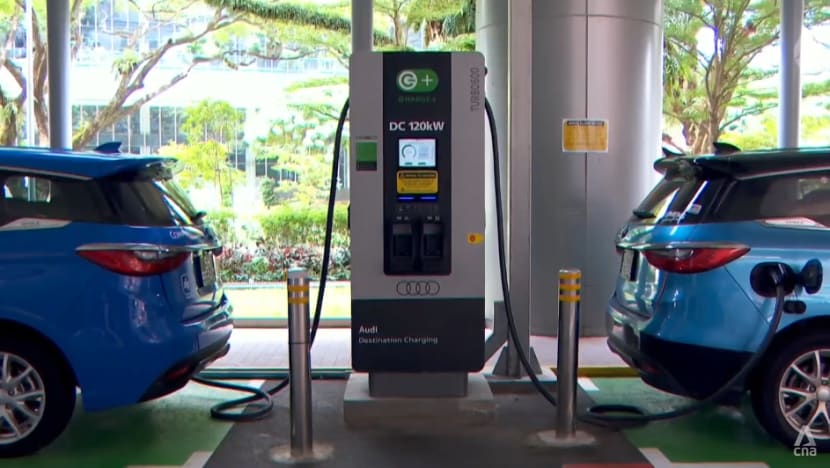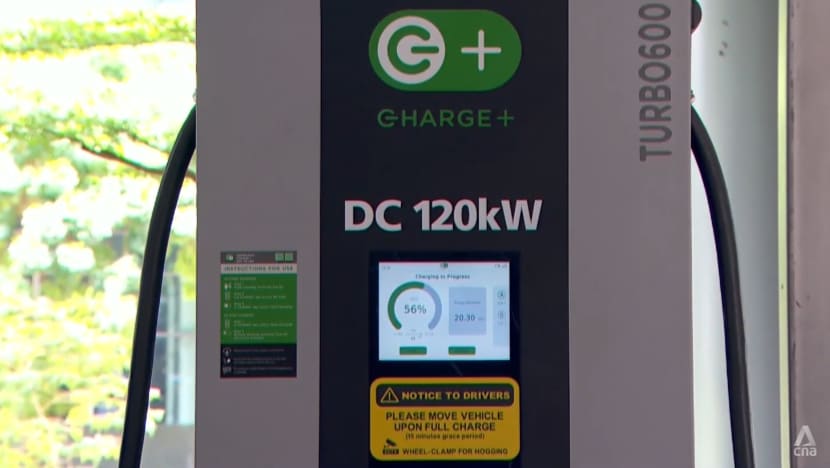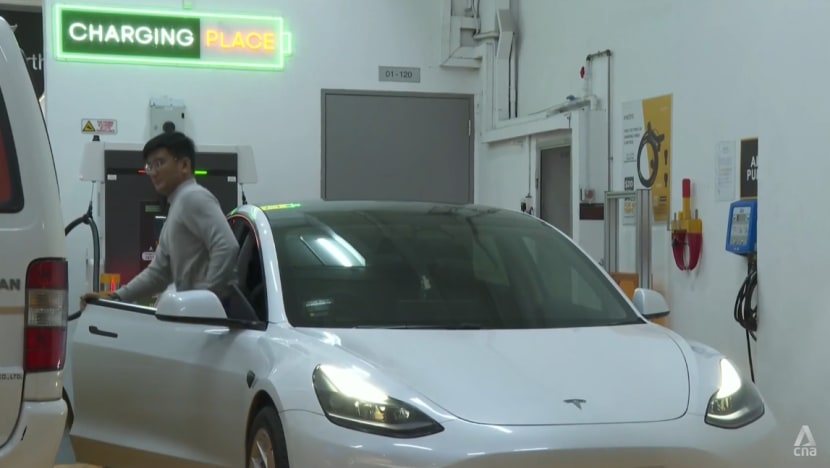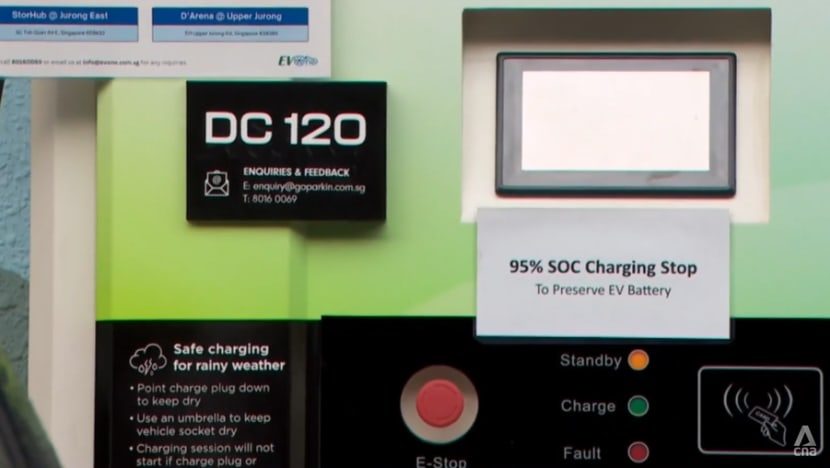Hogging EV stations? You could be fined, as providers accelerate efforts to free up hotspots

Electric vehicles (EVs) are parked at a fast charging station in Singapore. To prevent hogging, some charging providers are imposing additional fees for cars that overstay.
SINGAPORE: Some electric vehicle (EV) charging providers have started to impose fines to prevent users from overstaying at charging stations.
For instance, SP Mobility, a subsidiary of utilities company SP Group, has implemented an “idle fee” for drivers who do not vacate certain popular lots after their cars are charged.
Charge+, the largest EV charging network in Singapore with 1,500 charging points, is looking to follow suit from next quarter by putting in place a similar penalty.
CHARGING USERS WHO OVERSTAY
From last December, SP Mobility has been penalising drivers who do not unplug and move their vehicles from selected SP charging lots within a grace period of 30 minutes after a session has ended with a S$0.50 fine per minute, capped at S$20 each time.
The measure is in place at eight public locations and certain condominiums. Fees apply between 7am to 10.30pm every day, except at petrol kiosks, where the rule applies all day.
SP Mobility has adopted a measured approach to the regulation by applying it only to a handful of locations and ensuring ample time for users to shift their vehicles through the grace period, said its head Dean Cher.
He added the move will allow drivers to gradually adjust charging behaviour and foster the right etiquette when using such shared facilities.
“This was aimed at deterring hogging and reducing waiting times, with the intent of encouraging considerate charging etiquette, improving charger availability, and enhancing the charging experience for all EV drivers,” he said.
The operator, which has a growing network of over 1,000 charging points across 300 locations around the island, said it is monitoring the feature through real-time data and user feedback, and may apply the fee to more areas if necessary.
MORE PROVIDERS TURING TO FINES
In the coming months, Charge+ will similarly start imposing idle fees on selected locations through its mobile application.
Among the first hotspots that will be subject to the new rules are lots at CT Hub in Kallang, where 30 to 40 cars are charged every day.
To prevent hogging, cars that stay beyond a full charge and a grace period may have their wheels clamped.
“The turnaround is very fast for this location, because of the sheer number of EV drivers and therefore the grace period becomes short. They (CT Hub’s management) are prepared to exercise the wheel clamp,” said Charge+’s CEO Goh Chee Kiong.

However, the firm said such financial disincentives are not straightforward to roll out, as landlords need to assist with monitoring the charging stations and enforcing the rule.
“We respect that different landlords have different approaches. So even as we roll out this idle fee, our variety of approaches will still remain because there are some landlords that would have their own system and there's also the question of who collects the so-called penalty for the drivers staying beyond the grace period,” said Mr Goh.
“Therefore, it will be a case-by-case basis for which we will work with the respective landlords.”
He said the firm is still finalising the details of the policy and did not specify the fees.
Some EV drivers have welcomed such penalties, saying it can be difficult to find a charging point as users often leave their vehicles plugged in even after a full charge.
Mr Koh Jie Meng, who has been driving an electric car for five years, said he has experienced instances when his battery had nearly gone flat before he could find a charging spot.
“Of course, hogging makes drivers feel frustrated. But it is a lifestyle that we have to adapt to. Because things are so new, drivers initially who adopt EVs from petrol cars will need more education,” he said.

EDUCATING USERS ON BEST PRACTICES
The fee is one of many methods that providers have put in place to better manage limited charging stations amid a growing EV population in Singapore.
Some operators are not imposing financial penalties and are instead using reminders and educating users on best practices.
EVOne, another firm that provides EV charging solutions, puts up signs at its stations informing drivers that vehicles do not need to be fully charged.

Depending on the model of the vehicle, the average distance of an EV on one full charge is between 300km and 500km.
The firm does not plan to impose any fees for overstayers, saying it could be counterproductive as it would need to divert manpower away from its core business.
Instead, the provider sends notifications via a mobile app and SMSes to inform drivers that charging sessions have ended, and calls them if their vehicles remain parked there for too long.
The firm said these nudges have helped, with the number of complaints dropping over time.
“Sending all these messages periodically helps users to remember the good charging practices, and helps them to be very careful and mindful when their charging has stopped,” said EVOne’s chief charging officer Toh Ann Cher.
FAST CHARGERS REDUCE WAIT TIME
The firm specialises in direct current (DC) fast charging points, which can replenish up to 90 per cent of a battery's capacity in just 20 to 30 minutes, compared to seven to eight hours for regular alternating current (AC) chargers.
Ms Toh said fast charging stations get fewer instances of overstaying as the short charging period means users do not usually lose track of time.
“DC users know their charging is very fast, so they already know the length of time needed for each charge and hence are more cautious. It is a different charging habit. In contrast, those using AC charging do not really take note of the time as it is (too long),” she said.
EVOne has both fast and AC chargers across 15 locations in Singapore, and plans to add another 10 locations this year.
The company's expansion is in line with Singapore's plans to widen its EV charging network with more fast chargers to serve commercial fleets like private hire and delivery drivers who need to charge their vehicles more often.
Some 120 fast charging points will be installed in 60 carparks across the island by the end of this year.
Transport Minister Chee Hong Tat said on Tuesday (Mar 5) deployment will soon begin in areas including Boon Lay, Kallang Bahru and Woodlands, to support an increasing number of greener vehicles in Singapore.
“In the first two months of this year, 30 per cent of cars registered were EVs and almost 50 per cent were hybrids. So, altogether about 80 per cent of new cars are now cleaner-energy vehicles,” he said.


















